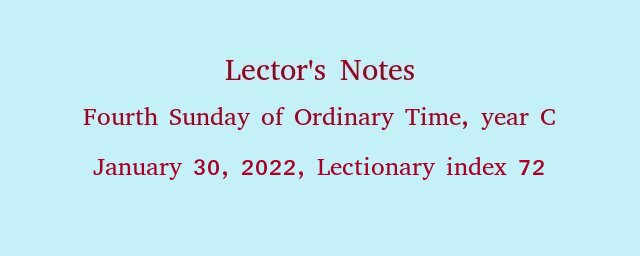

Fourth Sunday of Ordinary Time, January 30, 2022
Jeremiah the prophet had to preach to corrupt kings and religious leaders of ancient Judah, who opposed him fiercely. Here God assures Jeremiah that he has always had God's support.
Recently we've heard Saint Paul's teaching about how the spiritual gifts, the charisms of healing, prophecy, teaching, speaking in tongues, interpreting tongues, etc., are meant to unify the members of the church. Here is the teaching about the spiritual gift that Paul considers the greatest.
Saint Luke's gospel was written for Gentile converts. They knew a little about Judaism and wondered why Jesus had not received a better reception among more Jews. Early in his gospel, Luke addresses that question.
The Liturgical and Historical Situations: As usual, the first reading today prepares us to hear the gospel, Luke 4:21-30, where Jesus, early in his mission, faces stiff opposition and compares himself to the prophets who came before him. The prophet Jeremiah never held back in describing or complaining about the persecution he suffered. (See Lector's Notes, 22nd Sunday of Ordinary Time, Year A, for more on this.) Here, in the first sentences of his book, he describes how God called him, bolstered him, and predicted the opposition Jeremiah would endure.
Proclaiming It: Express carefully that Jeremiah is relating something God said to him. Before you even speak, pause. Pause longer than you think is necessary. Then say the first sentence solemnly:
The Historical Situation: As Lector's Notes have noted on other Sundays when we read from 1 Corinthians 12-14, among the Christians living in the Greek seaport Corinth, there were diverse manifestations of the gifts of the Holy Spirit. Prophets, preachers, healers, teachers, you name it, the Spirit bestowed the job on someone there. These folks often exercised their gifts in spectacular, ecstatic ways that drew a lot of attention, as they do today among people who attend revivals and the crusades of some faith-healers.
Paul spends chapters 12, 13 and 14 of this letter trying to get the Corinthians to enjoy and express their gifts in ways that give strength to the community and glory to God. For the natural tendency of some of the supernaturally endowed was to glorify themselves with their God-given power.
So why does Paul care so much about the Corinthians' use of the spiritual gifts? It's his goals: The unification of the church by the humbling of all members, the squelching of their rivalries, and the re-direction of their efforts to mutual service and mission. Understand that, and make those your own goals, and you'll proclaim the reading properly.
Today you get to read in their context the sentences familiar from so many weddings, "If I speak with the tongues of men and of angels, but do not have love ..." It's consoling to realize that, while the Spirit may not grant one tongues or healing powers, one can always choose to exercise the gift of love, which Paul ranks higher than all the rest.
Proclaiming It: In the first sentence, emphasize the superlatives "greatest" and "more excellent." This lets the congregation know you're going to compare and contrast some things. In what follows, use contrasting tones, and variations in your pace, to contrast each of the less important spiritual gifts with the gift of love.
Contrast is the rule in the last paragraph, too. Don't rush it and don't blunt the contrasts. When Paul says "when the perfect comes" and "then I shall know fully," he refers to a future divine intervention, somewhat unspecified, that will let us know everything more clearly than we can know now. Your proclamation should make your hearers eager for that intervention.
Jesus teaching. The medium is a late fourth century sarcophagus, proudly claimed by the Village of Rignieux le Franc in southeastern France. The graphic comes from a wikipedia contributor self-named PHGCOM, also "World Imaging". The photographer says of this image: "Source: Own work, photographed at Le Louvre" in 2007. A generous selection of larger copies of the same photo is here.
For the provenance of the sculpture, click here and scroll down to the headline "LE SARCOPHAGE PALÉOCHRÉTIEN."
This page updated December 4, 2021